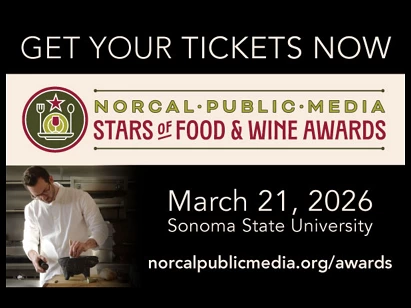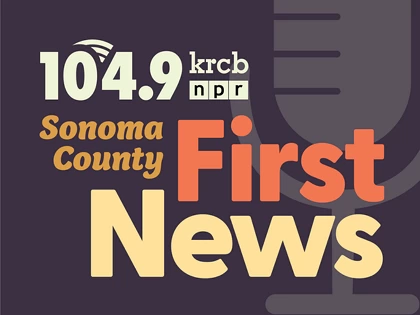 The Sacramento River separating Sacramento County (left) and Yolo County (right).
The Sacramento River separating Sacramento County (left) and Yolo County (right). photo credit: USDA
As KRCB has previously reported, it is almost certain there will be no commercial or sport salmon fishing off the California coast this year. This latest story in our series features voices from local fishermen and advocates at a recent meeting of the Pacific Fisheries Management Council.
For Jared Davis, the announcement was already a foregone conclusion. California’s salmon season will be closed in 2023, and he said there’s not any other option.
"I think everybody was just here to send their support to the salmon advisory subcommittee that had a tough time trying to come up with these options, knowing the negative repercussions that it's going to have on the fishing communities," Davis said.
The thread woven through all the challenges facing salmon and the fishing industry, is as Dominic Weaver, a recreational fisherman from the Mendocino Coast said: water.
"The habitats that are threatened, it's not because of the fishing, it's not because of the predation out in the ocean," Weaver said. "It's coming down to not enough water because they're diverting it and sending it other places."
Sacramento, the city, and the river looms large over the struggle for California’s native salmon.
The number of fish projected to return from the ocean to the Sacramento River delta is under 170,000 salmon.
Davis said policy decisions in Sacramento have had detrimental impacts on the fish.
"The Golden State Salmon Association is in court right now to fight for water legislation that is on the books," Davis said. "It's already there, but it has been waived over and over again by this administration as well as previous administrations."
Earlier this year, Governor Gavin Newsom signed an executive order urging California’s water board to waive environmental laws and reserve water for future agricultural use, that would otherwise be released to help insure the survival of native fish and wildlife species.
The board, which initially waived the environmental protections, ultimately reversed course as more rain belted California and raised reservoir levels.
Davis said water can sometimes defy conventional politics.
"The politics of water mismanagement readily and consistently traverses party lines," Davis said. "So we're trying to get equitable allocation of the resource to the different sectors, agricultural, residential, and environmental, which supports the salmon."
Money plays a big role too, Davis said.
"Agriculture in California is a big, big business," Davis said. "I'm not talking mom and pop farms here. These are multi-billion dollar corporate agriculture entities that take about 80% of the available water and the residential and the environment get to fight over the remaining 20%."
"So particularly when the resource gets slim, unfortunately the environmental sector and the salmon take a backseat," Davis said.
Salmon need cold water and adequate flows to survive in river habitats.
Marc Gorelnik of the Pacific Fisheries Management Council said he believes the lack of balance in water distribution in California is to blame for the declining salmon numbers.
"We've seen the average abundance of salmon fall by two thirds as almond acreage has more than tripled," Gorelnik said. "So I'm not saying specifically it's that drop of water that went to that almond tree, but you can see where we have increased water demands by agriculture that didn't exist before, and that water has to come from somewhere."
Gorelnik said protecting salmon is also about protecting California.
"You don't need to be anti-agricultural," Gorelnik said. "You just need to say, hey, the salmon, were here first. They're a native species, they're an iconic species of California. Let's take care of them. Let's not let them slip into extinction and let's have some abundance.
"So not only can, can anglers, whether they be commercial or recreational, apply their trade and all of the businesses that rely upon that, but so consumers can have fresh, wild, healthy California salmon in the stores and on their dinner plate," Gorelnik said.
Tim Obert, a salmon fisherman based out of Santa Cruz, said the ramifications of the closure could be devastating.
"There's people that don't have any savings," Obert said. "There's people that they put everything they had into being a salmon troller. They're boat's not big enough to go tuna fishing. It's not big enough to crab, but it's what they can afford. And so it's important that they take it seriously here because it's going to affect, you know, the lives of thousands of people, and the communities."
Weaver said those ramifications will go well beyond the confines of the docks.
"In our community, Coastal Mendocino, we rely on tourist dollars," Weaver said. "I mean, there's very little logging, the mills are closed, and the commercial fishing that's there has now becoming so restrictive that the fleet is a fraction of the size that it used to be, and that has a direct correlation to the quality of life in the community."
"Cause there's not as much money coming into the schools, there's not as much money going into the roads, everything changes because of that," Weaver said. "So when the fishery is healthy and we're able to get the tourists to come and fish at our coastline, it brings dollars in to help the community, the businesses, everybody."
While many of the fishermen remain optimistic that the declining salmon stocks will reverse as they have previously, Weaver said this season’s closure spells at least one certainty.
"It's gonna spell a lot more days tied up to the dock," Weaver said. "So you know, but we'll figure something out and hopefully we'll be out there catching 'em again next year."

 Live Radio
Live Radio




